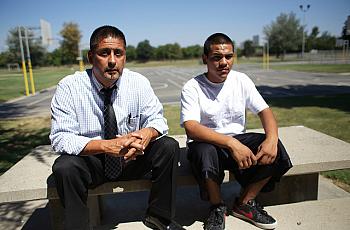
Rebecca Plevin
Project Editor

Project Editor
Rebecca Plevin is the project editor at the Fresno Bee bilingual Central Valley News Collaborative. She previously reported on health for the Desert Sun and KPCC, the NPR station in Los Angeles. She covers infectious diseases and consumer health issues, with a close eye on the cost of health care. She also wrote KPCC's consumer health blog, Impatient.
Prior to working at KPCC, Rebecca spent five years covering health news in California's Central Valley, first for the bilingual paper Vida en el Valle, and then for Fresno-based Valley Public Radio. She also contributed to The Reporting on Health Collaborative's groundbreaking series of stories about valley fever.
Rebecca’s work has appeared on national programs like Morning Edition, All Things Considered and Marketplace. She has also contributed to Capital Public Radio's health documentary series, The View From Here. She's earned an LA Press Club Award for best blog and the George Gruner Award for Meritorious Public Service in Journalism, as well as top honors from the California Newspaper Publishers Association and the National Association of Hispanic Journalists.
Rebecca grew up in the Washington, D.C. area and is a graduate of Northwestern University's Medill School of Journalism. She's also a fluent Spanish speaker, an avid rock climber and an acro yoga fanatic.

The Los Angeles Department of Health Services will start approving hepatitis C drugs for active IV drug users. Until now, the department had withheld approval for anyone who had not been drug-free for at least six months.

"It's our obligation to offer treatment in a manner that's rational and logical," said the county's chief medical officer. "We identify the individuals for initial treatment right now, based on how we can offer the most care to the most people, who are going to benefit from it the most now."

How one reporter "fell down a data rabbit hole" while investigating how many Medicaid patients were denied costly hep C drugs, and what she'll do differently next time.

Calif.’s revised eligibility rules for new hep C drugs appear to be easing Medicaid patients’ access to the medications, yet the vast majority of Medicaid patients with hep C still aren't getting the costly drugs, state health officials say.

When extremely expensive new hepatitis C medications arrived on the market more than two years ago, private health insurers limited access to the very sickest. Now, two new analyses say that approach is shortsighted and counterproductive.

New hepatitis C treatments are both staggeringly effective and expensive. This has sparked a nationwide discussion about the high cost of specialty drugs and how such costs are keeping patients from needed treatments. Prescribing data may offer new insights.

Some kids born into the gangster lifestyle live to survive. If they want a different future, they will struggle to break free. One charter school aims to rehabilitate such students. This story is part of the Class Dismissed documentary from Capital Public Radio.

When some youth journalists report on environmental health issues impacting their own communities, are they able to maintain neutrality or do they advocate for change?

Just how well is California doing transitioning children from the outgoing Healthy Families low-cost health insurance program to Medi-Cal? The state's version of its progress is rosier than what children's health advocates are seeing on the ground.

A new report looks at using health information technology for outreach and enrollment efforts, but in a manner that takes into account the digital divide.